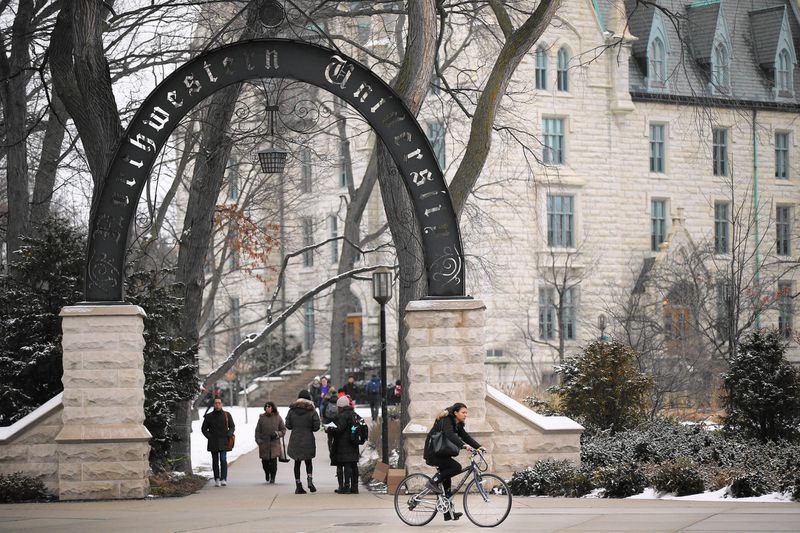The Daily Northwestern should not have to apologize for doing their job
December 14, 2019
Early last month, Northwestern’s student newspaper, The Daily Northwestern, came under fire by students who protested former U.S. Attorney General Jeff Sessions’ visit to the Northwestern (NU) campus. The students complained that The Daily was wrong to publish photos and quotes of the protesters. Students also disapproved of reporters from The Daily using the Northwestern directory to contact students and ask if they wanted to be interviewed for the story, finding the process invasive.
Though the original backlash was controversial in and of itself, The Daily’s subsequent apology escalated the story to the national conversation, with CNN, USA Today and The New York Times all reporting on the controversy. In the apology published Nov. 10, The Daily wrote that, “While our goal is to document history and spread information, nothing is more important than ensuring that our fellow students feel safe — and in situations like this, that they are benefitting from our coverage rather than being actively harmed by it. We failed to do that last week, and we could not be more sorry.”
Media response has largely been critical of The Daily’s decision to apologize; stories ran with headlines such as “Northwestern’s student journalists made a mistake” from CNN and lines like “Instead of taking justifiable pride in their reporting, the editors — shockingly — apologized,” according to the Editorial Board of the Chicago Tribune.
While we recognize that The Daily thought critically about their coverage of the Jeff Sessions protests, we at The Evanstonian believe that The Daily should not have to apologize for what were seemingly basic and respectful journalistic practices. Students who were protesting Sessions were in a public place and were therefore placing themselves “at risk” of being photographed. Just as The Evanstonian does, The Daily took photos of a public protest that was relevant to their news coverage and their audience. In addition, contacting students through the Northwestern student directory to find sources is a logical and understandable practice in order to fully capture the event and its student perspectives. If students didn’t want to be interviewed, then The Daily should and did respect those wishes, as far as we understand.
As a student publication like The Daily, The Evanstonian understands the complicated nature of covering student protests. Some NU students were concerned The Daily was exposing protestors to disciplinary action by the Northwestern administration through publishing the identities of the protestors through photos and quotes. However, as stated above, the protest against Sessions was public and by protesting, students were putting themselves in the public eye. If Northwestern takes disciplinary action against the students who protest, that is completely independent of The Daily’s coverage. The Daily, or any newspaper for that matter, has no ethical or legal obligation to protect public protestors from discipline by an authority, just as they have no obligation to incite authorities to discipline protestors. It’s not the choice of The Daily to punish protestors; it’s the administration’s. More broadly, journalists need to be able to report the news without being impeded and distracted by an overly critical public.
This backlash against The Daily is not the only recent example of students disapproving of their school newspaper’s standard journalistic practices. On Sept. 13, The Harvard Crimson, Harvard University’s student newspaper, reported on a student rally against United States Immigration and Customs Enforcement (ICE). In the article, the reporters stated that ICE did not respond to their request to comment. Soon after, some students critiqued The Crimson’s decision to contact ICE in the first place, saying that “a request for comment is virtually the same as tipping them off, regardless of how they are contacted,” according to an online petition started by Act on a Dream, the student group that organized the rally. However, unlike The Daily, The Crimson editors stood by their reporting and said in a statement that, “Every party named in a story has a right to comment or contest criticism leveled against them.” This response is an example of how The Daily should have dealt with the backlash they faced. Though the respective controversy around The Daily and The Crimson were different, the underlying conflicts were the same. They both reported with integrity and accuracy, and were criticized for that reporting.
However, there are many situations when public response to reporting is important. Of course, journalists need to be held accountable by the public, and they should be challenged when they’re reporting irresponsibility. The right to speak out against the press is an essential function of our society, one that admittedly is not afforded to some people in many situations where it should be. But in this case, the backlash The Daily received for their reporting just obscured the original story. Many people became so caught up in the coverage of the reporting that we have all but forgotten what the original reporting was about. When journalists are doubting themselves and readers don’t engage in civil ways, the public ultimately suffers from diluted versions of the news — partial versions of our history.
As Medill Dean Whitaker wrote in a statement regarding the controversy, “I might offer, however, that [The Daily’s] well-intentioned [apology] sends a chilling message about journalism and its role in society. It suggests that we are not independent authors of the community narrative, but are prone to bowing to the loudest and most influential voices in our orbit… But regardless of their own identities, our student journalists must be allowed—and must have the courage—to cover our community freely and unfettered by harassment each time members of the community feel they have been wronged.”








